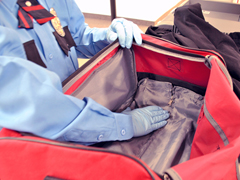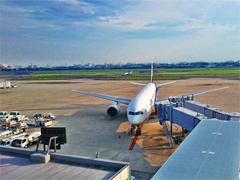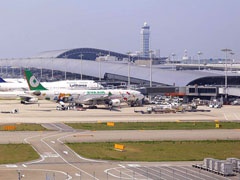Concealment is the act of hiding or preventing something from being known. It happens more often than we’d like, ranging from minor infractions to major threats to our security. The unknown variable of who may or may not try to sneak items passed the checkpoint constantly requires security personnel to be on guard.
Fortunately, personnel are trained to detect anomalies and pick up on various concealment methods used by these offenders. Let’s discuss concealment and some creative tactics observed in the industry that all checkpoint staff should be aware of.
Read More
Topics:
Aviation Security,
General Security,
Cargo Security,
Ports & Borders,
Critical Infrastructure,
Transportation
Air cargo has always been a target for those wanting to cause harm to the transport industry. One of the ways they’ve done that is by concealing explosive devices into air freight on both cargo and passenger aircraft. Unfortunately, successful attempts have led to catastrophic consequences including severe damage to airline assets, disruption of the industry, and loss of life.
That’s why air cargo screening remains an imperative step in maintaining security. Without it, the industry would be incredibly vulnerable to explosive threats. Proper diligence must be exercised to protect the air cargo industry, the people working in it, and those utilizing its services.
Read More
Topics:
Aviation Security,
Cargo Security,
Security Threats,
Transportation
Today’s passenger and cabin baggage screening process is functional and airports manage to get by, but it is not sustainable in the long run given the industry’s predicted growth. The current screening model is inefficient and comes at the cost of many within the industry including airlines and passengers. For the past few years, several airports have shifted their attention to Smart Security solutions to handle the screening of passengers and their belongings.
Smart Security is a joint initiative of the International Air Transport Association (IATA) and Airports Council International (ACI). Its goal is to streamline the passenger journey from curb to airside. The idea of Smart Security has been around for a few years now and the industry is just now able to implement these ideas into practical solutions without sacrificing safety and security.
Read More
Topics:
Aviation Security,
Trends,
Critical Infrastructure,
Transportation
Governments are the last line of defense when it comes to shaping policy concerning aviation security. Since there is no overarching global regulator to oversee all governments in every country, the handling of aviation security policy ultimately comes down to individual governments themselves.
As a result, the aviation industry faces challenges related to individual governments and how critical aviation security issues are handled by each. Industry desperately needs governments to overcome these obstacles in order to have a more secure and effective aviation market. Let’s discuss some governmental challenges in the aviation sector.
Read More
Topics:
Aviation Security,
Cargo Security,
Transportation
On the morning of Tuesday 21 March, the United States announced an electronics ban on inbound direct flights from certain Middle East and North African countries and required nine airlines to comply within 96 hours. The United Kingdom released similar restrictions later that day affecting 14 airlines.
Both bans order airlines to prohibit passengers from bringing large electronics into the cabin of the aircraft, but to instead place them into checked baggage. Although there is no direct threat or plot authorities are aware of, US officials say it’s a move in response to terrorist organizations working to perfect techniques for hiding explosives in electronic devices. Let’s take a closer look into the aviation threat causing governments to implement bans.
Read More
Topics:
Aviation Security,
Cargo Security,
Security Threats,
Transportation,
Current Events
One of the primary weapons of choice for terrorists and lone wolf attackers has been the Improvised Explosive Device, or IED. These dangerous, homemade devices are typically constructed from common household items making them rather inexpensive to build. Nevertheless, IEDs can pack a powerful punch and have been known to cause an extraordinary amount of damage and loss of life.
Consequently, security checkpoint personnel must always be on high alert for the IED threat. If allowed to pass through a checkpoint, the device will certainly be used with malicious intent. At a fundamental core, security personnel must gain a basic understanding of improvised explosive devices and how they are constructed in order to recognize when one is presented before them.
Read More
Topics:
Aviation Security,
General Security,
Cargo Security,
Ports & Borders,
Critical Infrastructure,
Security Threats,
Transportation
By the end of 2016, over 3.7 billion passengers will travel this year. According to the International Air Transport Association (IATA), forecasts for 2035 will nearly double at 7.2 billion air passengers travelling in a single year.
The biggest driver of air travel demand is expected to be the Asia-Pacific region whereby more than half of aviation’s new passengers will come from over the next 20 years. A key concern for the aviation industry is that the region’s current infrastructure will not be able to keep pace with the forecasted passenger growth. In fact, some runways and airport terminals in the region are approaching capacity limits or already over capacity. Any plans for building new airport infrastructures must happen soon.
Read More
Topics:
Trends,
Critical Infrastructure,
Transportation,
Current Events
The recent safety recall of the Samsung Galaxy Note7 smartphone is causing a stir within the aviation industry. Dozens of consumers have reported these devices catch fire while charging. These incidents have been attributed to faulty lithium ion batteries. As a result, many airlines and aviation organizations have banned their use aboard airplanes.
This restriction comes as no surprise since earlier this year, International Civil Aviation Organization (ICAO) put into effect new regulations concerning this dangerous good. The temporary aviation ban prohibits all cargo shipments of lithium ion batteries from flying on passenger aircrafts. The risk of an aircraft fire is too significant given that lithium batteries contain very high levels of energy and current in-flight suppression systems are not strong enough to put out these types of fires.
Read More
Topics:
Aviation Security,
Transportation,
Current Events
Whether you’ve realized it or not, X-ray security screeners exist everywhere. That’s because X-ray screening technology is present in so many industries. We can find X-ray screeners at airports, cargo facilities, courthouses, schools, correctional facilities, immigration agencies, special events, and more.
These X-ray operators work endlessly to protect the surrounding people and infrastructures from harm by inspecting belongings, packages, and goods flowing through. They are trained to detect contraband, weapons, explosive devices, and drugs. Every day, X-ray security screeners put themselves in potentially dangerous situations and risk their lives to protect us.
Read More
Topics:
Security Training,
Aviation Security,
General Security,
Cargo Security,
Ports & Borders,
Critical Infrastructure,
Transportation
Aviation is an extraordinary industry powered by the cooperation of countless companies and people. Many of these same people aspire to keep air transport safe and running smoothly.
Unfortunately though, aviation has always been a target for those wanting to bring attention to their own cause by carrying out harm to the industry. It’s only a matter of time before the next attack or attempt occurs. That’s why the aviation industry must always be vigilant of the following threats.
Read More
Topics:
Aviation Security,
Trends,
Security Threats,
Transportation










